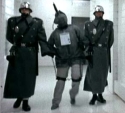|
In BFC I mentioned having experienced hyperinflation and there was some interest in learning more about the experience, so I figured I'd create this thread. I will try to keep this mostly about day in the life sort of stuff. If people want to discuss Brazilian politics in more detail, the Brazil thread is pretty good. Other Brazilian goons old enough to remember hyperinflation should feel free to contribute here as well. So, for background: I am Brazilian, born and raised. I was born in the late 1970s. Between 1986 and 1994 or so, Brazil experience a period of very high inflation:  Now, technically speaking, Brazil was only in a "hyperinflation" scenario for 3 months in 1990. That is because hyperinflation is technically defined as 50% or more inflation a month. But Brazil was regularly just slightly under 50% a month. In fact, accumulated inflation between January of 1986 and January of 1995 was 60,314,729,328%. In other words, for my childhood and most of my teenage years Inflation was a fact of life. During this period, Brazil had 6 different currencies. If people want to discuss the technical/economist side of all of this, I did my undergrad and some grad in Brazil in economics, so I am pretty familiar with the literature, but I figure that is the least interesting part. Before I get into how life was under hyperinflation, it is also important to note my family's position in Brazilian society. I don't want to portray myself as the every man or to pretend everyone had the same experience. It is hard to give a simple answer about my class background because Brazil is both incredibly unequal and international comparisons are even harder. My family was a family that most American and European goons would recognize as essentially middle class. My father was a college professor at a public university, my mother was a stay at home mom. We had our own house, but it was a fairly small house. The lot it was built on was about 120 square meters/ 1300 square feet. My parents would buy new cars, but it was always the cheapest model available (which in Brazil is your average euro car with 1.0 liter engines). We'd take vacations, but it was usually of the "go spend summer with grandma" type. My first international trip was a bus trip to Paraguay (and Paraguay holds a special place for people of my generation). In other words, few luxuries, but few needs as well. But Brazil is a poor country that has significant regional and urban/rural inequality (Brazil was the most unequal place on earth during this period). My family was urban and in the richest area of the country (the southeast). Which is to say that we were probably in the top 20% of the income distribution in Brazil, but likely pretty close to the median income for a city in the south east. So from an international point of view, or from the point of view of the city I grew up in, we were solidly middle class. From a national point of view, we were pretty privileged compared to other Brazilians. Life under hyperinflation: Brazilian hyperinflation has one peculiar characteristic compared to other hyperinflation situations, in that most formal things in the Brazilian economy were indexed. Formal wages, taxes, debt, savings accounts were all indexed to inflation. But this meant that within a month you'd start out ok but as the month went on your money became nearly worthless. It also meant that you had to be very careful with your finances. If you had to withdraw money from your savings account, you better be sure you withdrew it on the day your inflation adjustment and interest were paid or you'd lose most of it. All of this had a profound impact on how we lived life. - Groceries were a "once a month" thing. The day my dad got paid, he and my mom would take the car and go grocery shopping. It didn't matter that the supermarkets were full, it didn't matter that there were long lines. They'd get a nanny for me and my siblings and go. They needed all the room in the car to buy everything. All the perishable stuff as well. If your house didn't have a large pantry, you'd transform a wardrobe into a pantry. In my home the crawl space under the stairs was turned into said pantry. Milk was always the UHT pasteurized, shelf stable type. Bread was frozen. Not a lot of fresh salad, a lot of rice and beans. We had a separate freezer to freeze stuff in, and at the time more households in Brazil had freezers than had washing machines. Depending on the month and if there was some money left over, we'd hire a "cozinheira de freezer" or freezer cook. These were cooks that specialized in coming to your home and cooking everything in a way that could be frozen and cooked later. - Rationing was a thing because of this rush. It wasn't necessarily the case that there was a shortage of a particular product (though that would happen frequently when the government tried just freezing prices), but frequently supermarkets simply did not have enough room to hold a month's long supply for everyone who was trying to shop at the same time. - Same thing applied to gas. My parents would fill up their cars in the beginning of the month and try like hell to make it last through the month. - For the things that you have to spend as you go on, they would create "vales." So bus fare, school lunch, etc. you could buy these little certificates that could be redeemed for stuff later. So the day my dad was paid I'd go to school with money to buy "vale lanche," or these certificates that could be redeemed at the school cafeteria for snacks that would last me through the month. - There was this thing called inflation inertia. You'd start to get a sense of how inflation was going, and adjust to it. Let's say I had to pay you 100 bucks, but that my savings account was only going to readjust for inflation a week from today. Rather than lose that I'd just make a deal that I'd pay you 130 next week instead. - Because debt and salaries were indexed to inflation as well (if you were in the formal sector - because if you were in the informal sector you were generally hosed), everything could be bought in installments, something that lasts to this day. - Because price increases were in no way coordinated, you'd end up with some real anomalies. Say, stereos had their price readjusted and cars didn't, you could end up in a situation where a stereo would cost about 1/3 of a car. And since this was before bar codes, in most places you'd have people going around changing prices by hand with the little sticker gun. People wold call each other to share which stores had readjusted their prices and which ones were lagging behind. - During this period, there was also a massive expansion of the banking system in Brazil. Every little town would have a bank. Since savings accounts were indexed to inflation, everyone who could open an account, would open one. And banks were highly integrated. To this day, transfers between different banks are still almost instantaneous. - Banks however, were also at the whims of economic plans. Say, if the government decides to freeze prices, accounts would also be frozen, while prices in the black market would still go up. And at least at one point savings accounts were confiscated by the government. So any real money was generally immediately invested, and generally in real estate. Real estate would generally keep up with inflation, and the government had all sorts of incentives for construction, so for a long time it was the go to investment of the newly rich. Soccer players, movie stars, playboy covers would all talk about how they would invest in an apartment with the money from their contracts.
|
|
|
|

|
| # ? Apr 19, 2024 17:30 |
|
This sounds really interesting. Did you ever seriously talk with one of the "essential" workers, like that nanny, who had to work on the inflation day? Also, did businesses try to stagger paydays to let people avoid the rush or move to weekly wage payments, to attract people?
|
|
|
|
The answer here to both questions is surprisingly related: Low paid formal urban workers were actually comparatively well paid in relation to rural workers. So maids, nannies, cooks, etc in the city would be poor for the city but much better off than in the country side. The reason for that is that the minimum wage was indexed to inflation. So if you had a formal work contract (and Brazil has significant labor laws compared to the US), you'd get an indexed salary as well. Contracts didn't have to be an actual contract, Brazil had and still has this "work card," which is actually a booklet, that your boss signs, which acknowledges you have all the rights of the labor legislation. The people who were really hosed by inflation were informal workers (street vendors, etc) and rural workers (where situations analogous to slavery were and in some places still are common). Nannies were generally the maid of some neighbor and so they'd figure pay through a proportion of the minimum wage. To this day lots of data in Brazil on earnings is reported as multiples of the minimum wage. I.e., someone earns 5 minimum wages, 10, etc. As for why business didn't stagger pay: same deal. Minimum wage would get readjusted once a month. You want your pay day to be as close to that as possible.
|
|
|
|
I read through the wiki on Plano Real which was Brazil's plan to get out of hyperinflation, but how did that work in practice? What was the effect on the local and individual level? In retrospect (and within reason - nothing is ever perfect), could that have been done better?
|
|
|
|
So as I mentioned above the formal economy was mostly indexed, but the readjustment happened once a month. At that point, changing currencies was pretty common in Brazil. When a piece of candy starts costing 5000 cruzados, you slash 3 zeros and call it "cruzados novos." What the plano real did that was new was that it created the entirely fictitious "Unidade Real de Valor." Real unit of value. It wasn't an actual currency. But it was indexed to a certain amount of the currency and it would get readjusted daily. In the beginning, there was nothing really new. No one cared about URV, and so it was just a new currency (the cruzeiro real) with the same old inflation. But because the URV was adjusted daily at the rate of inflation, people slowly started using it to refer to prices and etc. So if you owned a store, you'd start out as usual by changing the prices every day, and then slowly you start to notice that URV is keeping up with inflation. So that instead of marking up things every day, places started to list prices in URV, salaries were indexed to the URV, and so slowly people started getting used to just using the URV for everything (even though you were still paying for things in the old currency, so if something is listed at 10 URV and the URV that day was 1000 cruzeiros reais, you'd get to the cashier and they'd quickly calculate that you owed 10000 cruzeiros reais). Now, there was no indexation for the URV itself. I.e., how many cruzeiros reais a URV was worth was indexed to inflation, but if your salary was 100 URVs it wouldn't suddenly be 110 URVs the following month. So this was a pretty ingenuous way of slowly getting rid of indexation. Eventually, they got rid of URVs and substituted it for the real, with the Real set at a certain amount of cruzeiros reais. Without indexation, there was less of a pressure to keep prices going up, it dealt with that inflation inertia that I mentioned above. To keep other sources of inflation from pushing prices up again, the government also significantly slashed import duties (remember that mention to Paraguay in the first post? Paraguay was essentially a giant duty free store for Brazilians). Additionally, the government didn't print as many reais as they were printing. So for the first time in a long time there was no inflation, and it wasn't quite as shocking a transition because by that point people were already thinking pretty much in URVs. So if we think of the Real plan as just the 1993-1994 transition, it was a pretty big success. The government that created it easily elected its successor. The issue is what comes after. I am pretty left of center as anyone who has seen my posts in CSPAM can attest, so I am not going to pretend to be neutral here. But I am going to try to give as neutral an evaluation of the real plan as I can, especially as an economist. The first thing that happens when inflation goes away is that fiscal discipline on the part of the government becomes important. You can't just print your way out of deficit spending. So a drastic austerity program was sort of inevitable. But not only didn't the government adjust spending or taxes as needed (though it did implement significant austerity measures, especially on education and public investment), but the government was also aggressively trying to value the Real. At one point it got to the point where 1 dollar=0.85 real. And this was a currency peg. So in order to maintain the dollar so low, real interest rates were extremely high . Real interest rates for government securities were in the double digits too keep dollars flowing in, topping out at one point at 45% yearly. This was devastating to local industries. Economic growth was ridiculously low, but inflation can be thought of as a regressive tax, so inequality initially fell. Additionally, for the first time, well, ever, buying imported goods, traveling internationally, etc. were all extremely cheap. That guaranteed continuous success for the ruling party, and they easily won most elections. Of course, keeping the dollar so low was unsustainable in the long run. You can't really be financing deficit spending with 45% interest rate securities and be viable long term. So as soon as the 1998 elections were done with and the 2nd term of the president started they switched the exchange rate from a peg to the dollar to a floating exchange rate. Almost immediately the dollar shot up to 2 reais, lot's of people who had bought a poo poo ton of imports on credit tied to the dollar went broke. The austerity implemented and the lack of public investment led to rationing of electricity in 2001. So PSDB, the party that was most strongly associated with the Real and wildly successful between 1994 and 1998 never won a national election again. When the left took over, they kept the key features of the Plano Real (no indexing of prices, no printing money to cover deficits, inflation targeting by the central bank). So inflation never came back. Part of the inspiration for this thread was me realizing that a lot of the younger generation in Brazil have no experience with inflation like we had.
|
|
|
|
Very interesting thread, thanks for posting it! How was in inflation in Brazil similar or different from the current situation in Venezuela? Both situations involve massive currency inflation, but seem affected by different economic realities.
|
|
|
|
|
literally this big posted:Very interesting thread, thanks for posting it! I've no real insight on the living conditions inside Venezuela, and doubt there is a neutral observer out there. But from my point of view far away, I think the big differences are: - Brazil is a much larger, nearly self sufficient country. There would be shortages of goods when the government tried to freeze prices, but those were mostly because of sellers moving things to the black market. There were videos of police going to farms to find cattle and arrest farmers who were selling meat on the black market. Venezuela is an economy that relied on exporting oil to import many of its basic necessities. Brazil was a pretty diversified economy when - Which is related to the other big difference, which is that hyperinflation in Brazil had perhaps more of a distributional rather than scarcity component to it. Hyperinflation was actually good and desired by many powerful groups in Brazil. Any sector that was primarily export oriented benefited greatly from it, for example (after all, getting paid in dollars while your own expenses are in a currency that is rapidly losing value is very profitable). Domestic industrialists also benefited from it (since imports were so expensive they had no competition). Benefiting a little less, but still benefiting from it were people who could put their savings and assets in inflation protected investments like real estate or certain types of savings accounts. So hyperinflation in Brazil was rough on those on the informal market or who didn't even make minimum wage. For formal wage earners it meant the stuff that I meant above, with having to adjust your lifestyle to frontload all your expenses every month (and maybe own an ethanol vehicle since Brazil produced its own ethanol but had to import part of its oil). But for some people, it was actually good times. I don't think the same can be said about Venezuela.
|
|
|
|
What kind of impact has foreign investment had during this period? I guess in terms of certain foreign-dominated industries, or cultural or labour law changes, that sort of thing
|
|
|
|
|
Sulla Faex posted:What kind of impact has foreign investment had during this period? I guess in terms of certain foreign-dominated industries, or cultural or labour law changes, that sort of thing During most of the hyperinflation there was virtually no FDI into Brazil, but that wasn't primarily over hyperinflation. Of course, the fact that profits in local currency would become worthless very quickly in terms of dollars probably had an impact. But it was primarily because of import substitution industrialization. Lot's of industries were reserved for Brazilian companies. The big multinational companies in Brazil were mostly in the auto sector, and even then they were mostly producing for the domestic market. After the real plan FDI skyrockets, though it was mostly through acquisitions rather than new investment. Culturally, the effect of these things could probably be felt through the way that Brazilian companies would act as intermediaries of international media markets. For most of the 70s and 80s, for example, Brazilian rock was dominated by the sons and daughters of rich people releasing 1 to 1 translations of international hits. Stuff like https://www.youtube.com/watch?v=8rFXLeDTWys https://www.youtube.com/watch?v=-6oj0iy1JKs Labor laws in Brazil are probably a bit more complicated to discuss, because labor rights on paper were very different from in practice. For most of the 60s and 70s for example a majority of the population made less than the legal minimum wage.
|
|
|
|
This is a really cool thread, thanks for making it! How did people talk about hyperinflation? In all the examples of hyperinflation I'm aware of it mostly just seems very stupid and annoying. Were regular people talking about the formal economic characteristics of the crisis, or mostly just the day-to-day logistical problems? What sort of informal arrangements, if any, did people set up to avoid using currency?
|
|
|
|
|
Inflation was just a part of life. There would be talk of "this supermarket hasn't readjusted prices yet" stuff. My wife, who comes from a lower middle class family (in a Brazilian context, probably just poor in an international context) would have her mother and aunts calling each other to talk about which places had or had not readjusted prices at that particular day. "Oh, you need toilet paper, I heard that such and such supermarket hasn't marked up prices today." Everyone was hyperaware of indexation. These things would be interrupted by the occasional currency change and price freeze. There was fairly little punditry or economist jargon, if that is what you are talking about. It was primarily the day to day stuff. In terms of informal arrangements, within families there would be a lot of just loaning goods rather than money. "Hey, we ran out of flour, can we borrow some? Ill buy you some when we do groceries at the start of the month." Finally, because credit was tight, I forgot to mention something that was very common: the literal translation would be "consortiums." There would be more or less formal versions of it (i.e., sometimes it would be run by a group of friends, sometimes by an actual organization). So let's say you want to buy a new car. But financing is a mess with all that inflation. So what you do is, say, you and 23 other people create this "consortium." Every month, on a give day, you pay 1/24 the value of a new car that month. So between the 24 of you you can afford a new car. Then you do a drawing to see who will get the new car that month. So maybe you get a new car this month and will be paying 1/24th of a car, however much that is, for the next 24 months. Or maybe you will be the last one to do it. It was the main way people would buy big ticket items, from tvs to fridges.
|
|
|
|
joepinetree posted:So let's say you want to buy a new car. But financing is a mess with all that inflation. So what you do is, say, you and 23 other people create this "consortium." Every month, on a give day, you pay 1/24 the value of a new car that month. So between the 24 of you you can afford a new car. Then you do a drawing to see who will get the new car that month. So maybe you get a new car this month and will be paying 1/24th of a car, however much that is, for the next 24 months. Or maybe you will be the last one to do it. It was the main way people would buy big ticket items, from tvs to fridges. There was a BBC article about this recently, I thought it was really cool how communities would do this. One thing it didn't address was if someone stopped paying. What typically happens if someone just stops contributing?
|
|
|
|
CongoJack posted:There was a BBC article about this recently, I thought it was really cool how communities would do this. One thing it didn't address was if someone stopped paying. What typically happens if someone just stops contributing? There were some business that appeared that would administer these things for people and have contracts and all of that, so that they'd take a fee in exchange for being responsible for things like repossession and so on. But for the informal ones among friends it would just be based on trust. So normally it would be family, or coworkers, people who knew they'd be seeing each other frequently. And ultimately it would fall upon the administrator of the consortium. So it was common to do things like charge a little extra (say, instead of paying 1/12 of a car each month, you'd pay 1/11) and put that extra in an inflation indexed savings account. So you'd use that extra to pay for anyone who stopped paying, and if there was money left over you could either divide the inflation corrected money among all those who paid their share, or maybe do a drawing among those who paid all their dues...
|
|
|
|
What happened to savings? Did it get reindexed too, or was it like you had 25k saved up in the bank and now it's worth 0.05?
|
|
|
|

|
| # ? Apr 19, 2024 17:30 |
|
zjentohlauedy posted:What happened to savings? Did it get reindexed too, or was it like you had 25k saved up in the bank and now it's worth 0.05? Savings were indexed, but you had to pay attention to the day you deposited money. In fact, because the government was trying to incentivize savings, income from savings accounts were tax free. So a savings account would pay inflation+interest. It wasn't uncommon, for example, for inflation to be 800% and savings pay 1000% in terms of indexation+interest. The problem, though, was that for this to be an advantage to you you'd have to be able to time your withdraws right. People would know the exact date that their savings account would pay out the interest. If you could save a lot and then not touch it, you'd be golden. That is, until 1990. In 1989 Brazil had the first presidential elections since the 60s. There were 22 candidates, and in the end there was a former union leader facing a right win politician in a run off. This still being the cold war, the right wing politician ran a campaign saying that if the leftist won, he'd confiscate all their savings. So the right wing politician won and in his first month in power he confiscated all savings accounts above a certain threshold. These would be frozen and unavailable to their owners for 18 months. 80% of all money in savings accounts were affected. After that, people were less likely to save (and the whole "got some money? invest in real estate" became even more significant). Indexation of savings accounts ended with the Real, the currency that helped end inflation.
|
|
|
















